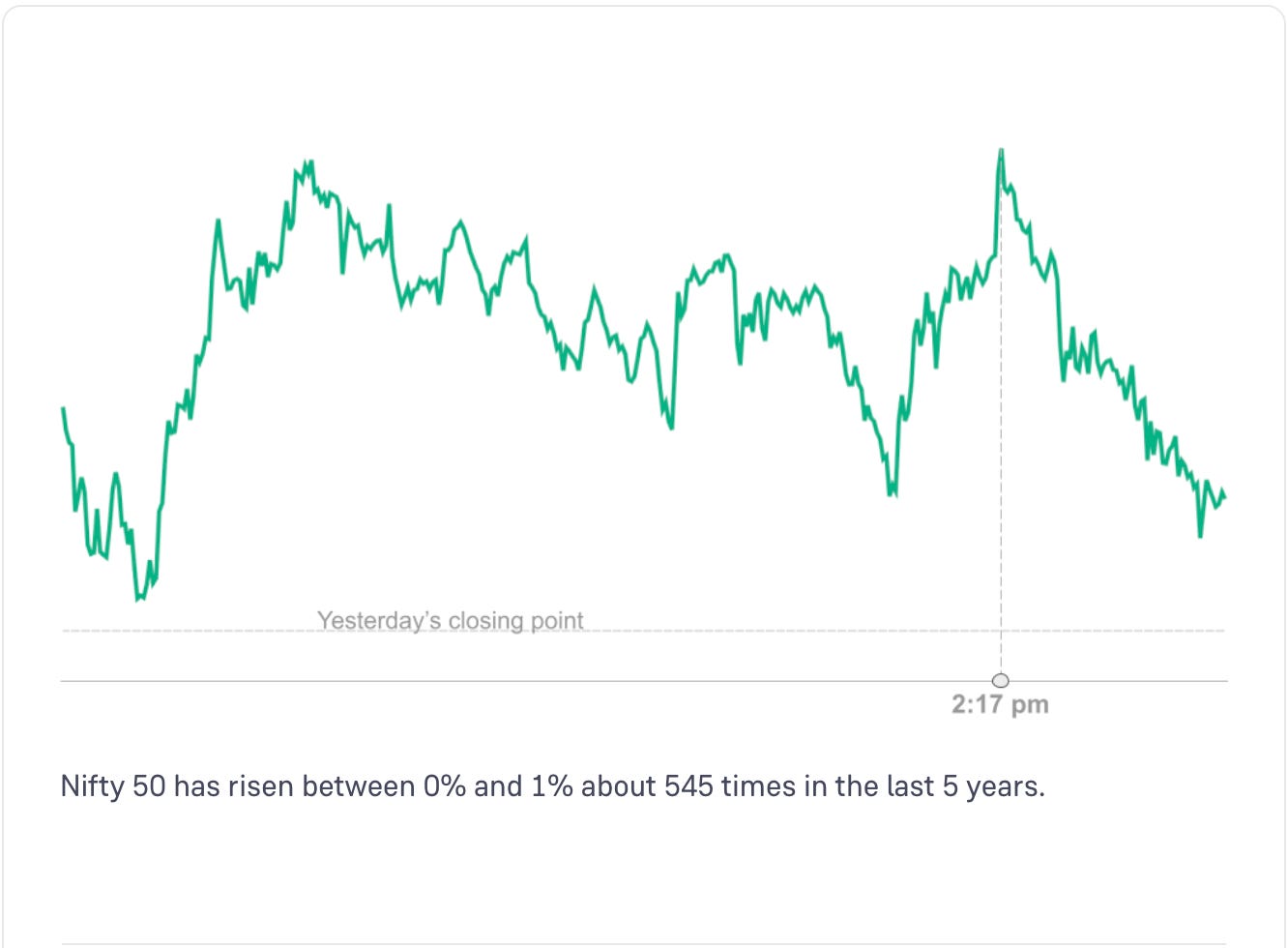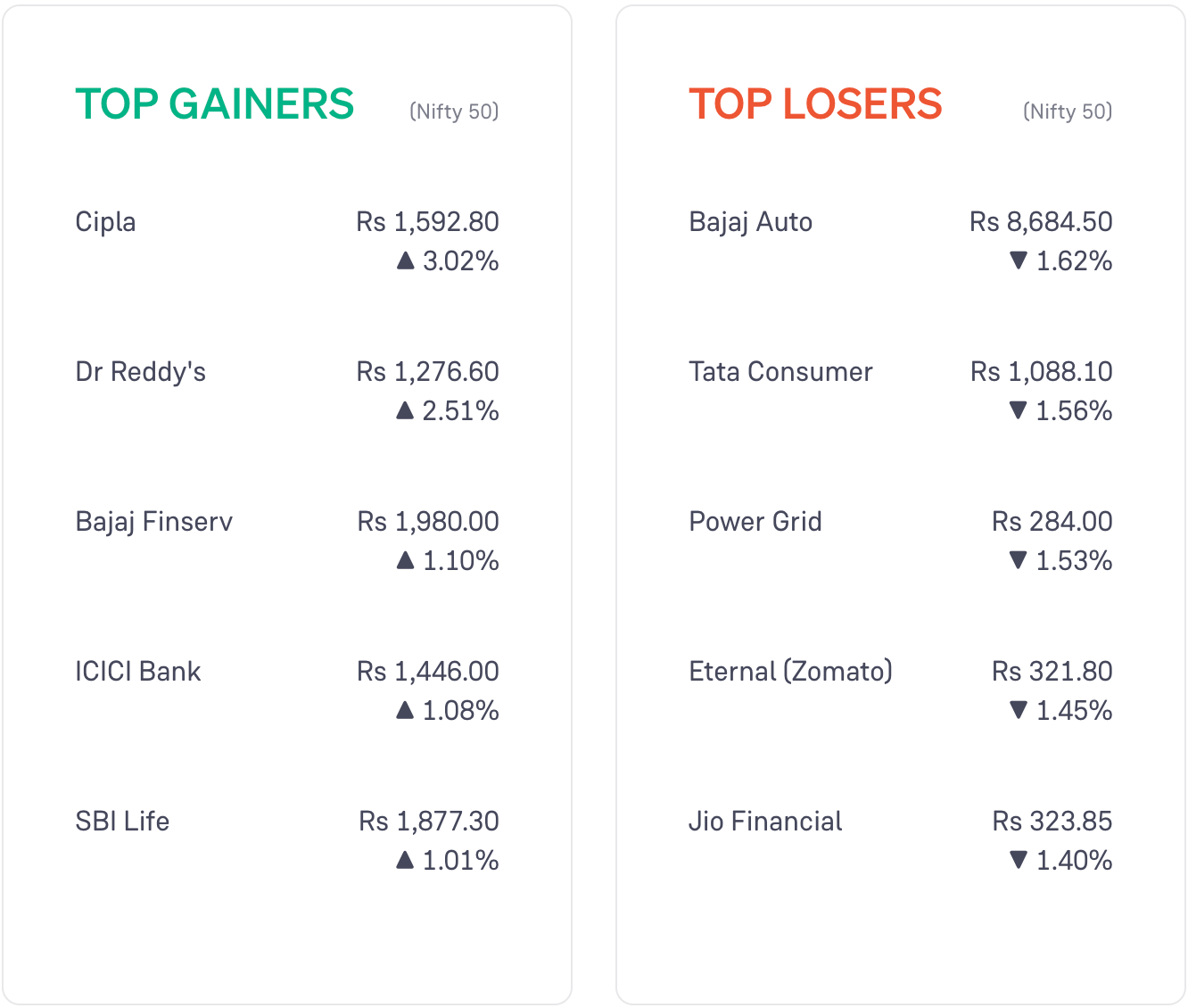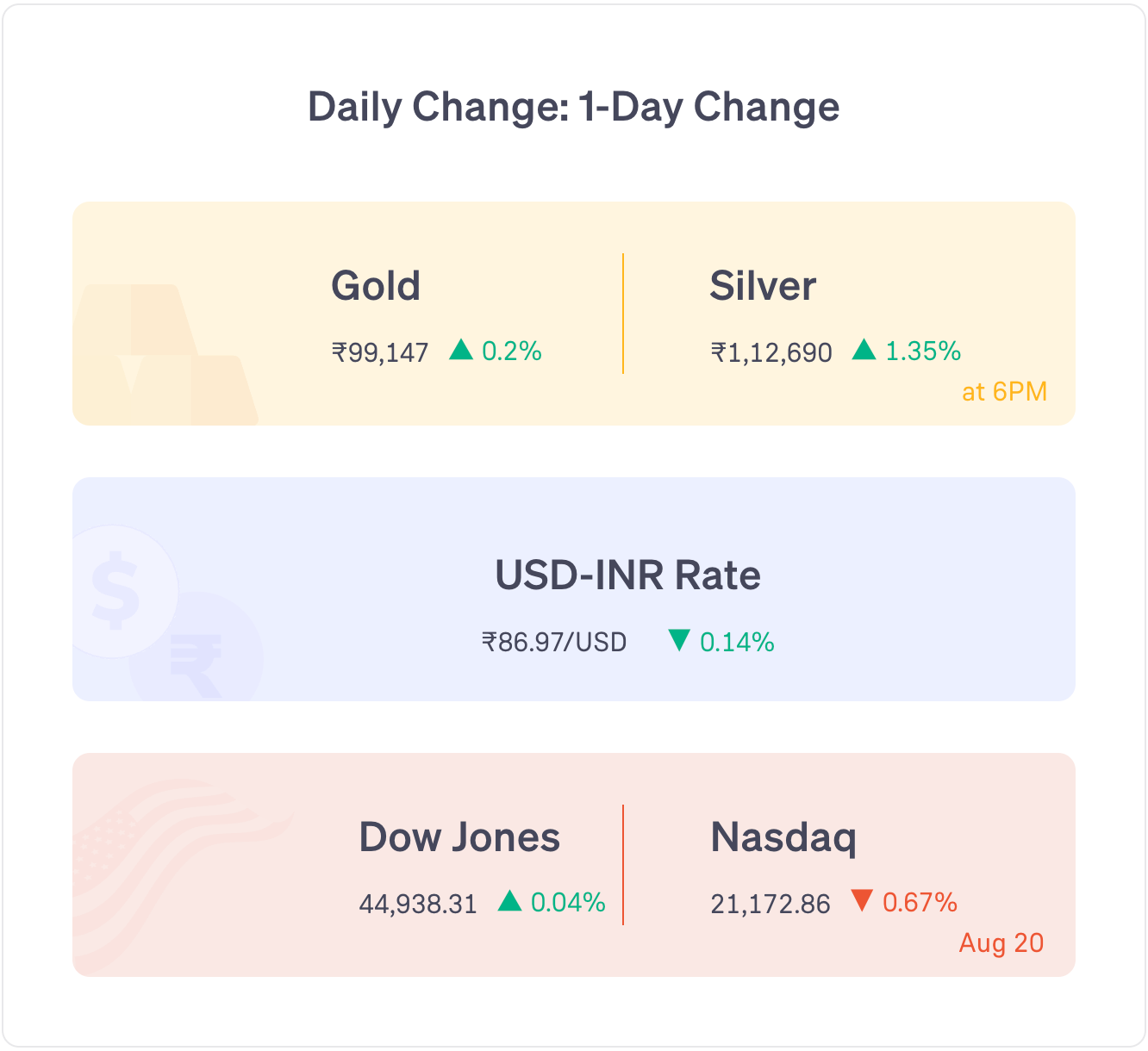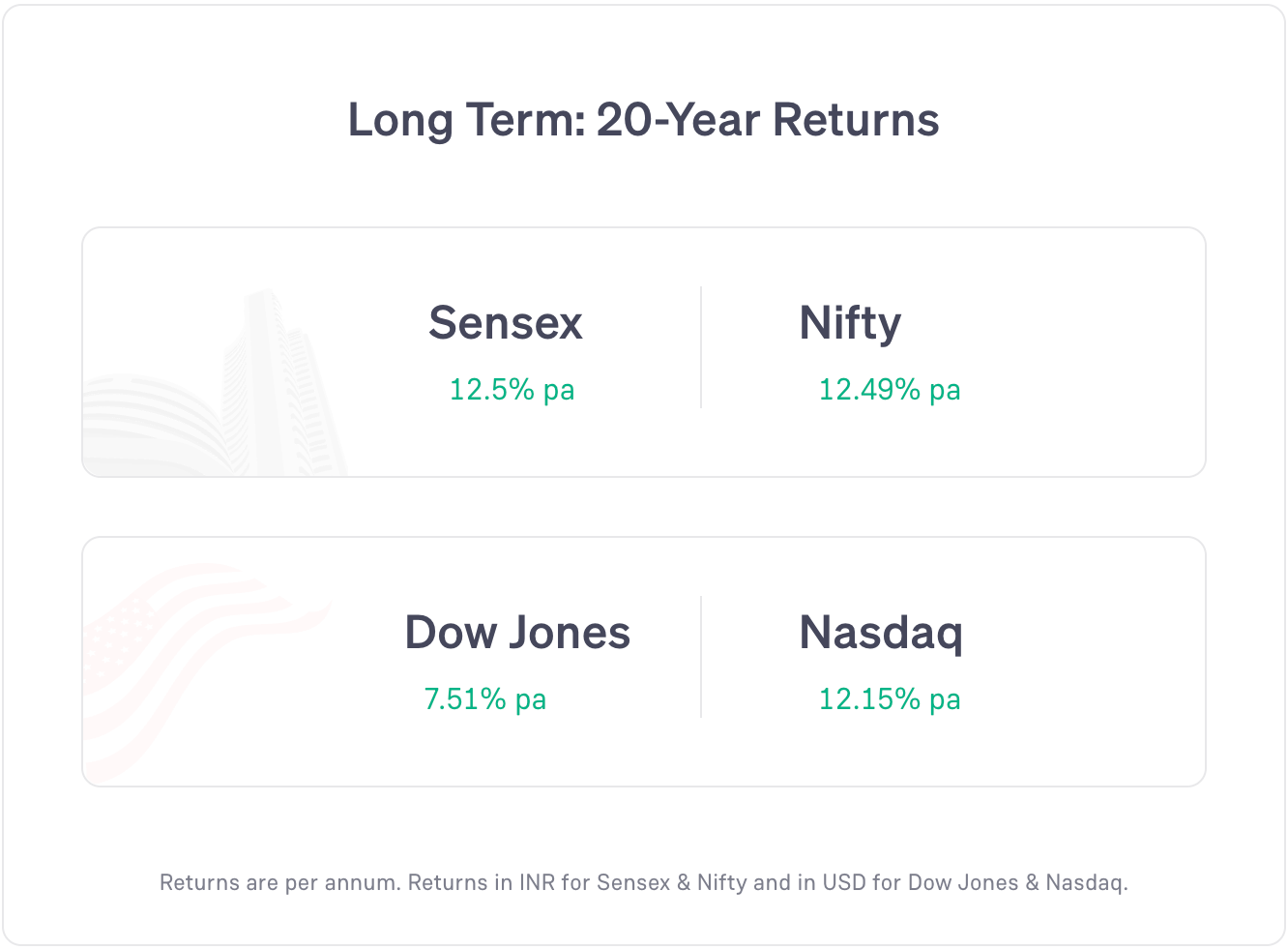US-EU finalize trade deal, Vedanta's Rs 16 dividend, & more — Daily Digest
Thursday, 21 August 2025
Markets opened above yesterday’s closing point.
Nifty 50 was a bit volatile during the day and closed in green.
Pharma stocks and healthcare stocks rose the most. FMCG stocks and PSU bank stocks fell the most.
Global markets: US markets were flat. Asian markets showed a mixed trend. European markets fell (as of 6 pm IST).
News
The US and EU have finalised their trade deal, with US setting 15% tariffs on EU goods. The US will lower auto tariffs once the EU lowers tariffs on US goods.
India’s composite PMI (manufacturing + services) rose to 65.2 in July (vs 61.1 in June). This means economic activity grew more in July than in June. Manufacturing PMI rose to 59.8 (vs 59.1 in June) and services PMI rose to 65.6 (vs 60.5 in June).
The Group of Ministers (GoM) on rate rationalisation accepted the Centre’s proposal for new GST reforms. They also proposed removing GST on health and life insurance premiums. The recommendations will now go to the GST Council for approval.
Vikram Solar IPO was subscribed 54.63 times. Retail subscription: 7.65 times. IPO is closed for subscription.
Gem Aromatics IPO was subscribed 30.27 times. Retail subscription: 10.31 times. IPO is closed for subscription.
Stocks Updates
Vedanta: the board announced a 2nd interim dividend of Rs 16 per share for FY 2025-26. Record date: 27 Aug.
Wipro: will acquire ER&D and IT services business from Harman International for up to $375 million. It aims to complete the acquisition by the end of 2025.
NTPC Green: declared commercial operation of 49.125 MW of solar capacity from its 300 MW Khavda Solar Project in Gujarat.
Lupin: launched Bosentan Tablets in the US used to treat pulmonary arterial hypertension in pediatric patients. The tablets had estimated annual sales of $10 million in the US.
IRFC: refinanced Rs 1,125 crore for Bhartiya Rail Bijlee Company (an NTPC - Railways Ministry JV) to strengthen its finances and lower power costs.
JSW Steel: company subsidiary, Mivaan Steels, won the auction for the Rajgamar Dipside coal block in Chhattisgarh.
Hindustan Aeronautics: the Cabinet Committee on Security approved the Defence Ministry’s proposal for the procurement of 97 LCA Mk-1A fighter aircraft.
Tech Mahindra: incorporated a wholly owned subsidiary, TechM Regional Headquarters Company, in Saudi Arabia to support and manage its subsidiaries in Bahrain and Egypt.
Word of the Day
Block Deal
It is when a large number of shares are bought or sold in a single transaction
In India, it usually means buying/selling at least 5 lakh shares or shares worth Rs 5 crore or more.
They are mostly used by big investors like mutual funds, banks, or foreign investors to buy or sell large chunks of shares quickly.
Block deals are done in a special trading window on the stock exchange to prevent sudden ups and downs in the market.
Block deals are different from bulk deals.
While they both involve large trades, a bulk deal happens during normal market hours. It is generally when an investor buys/sells at least 0.5% of a company's listed shares.
6 Day Course
Theme: how demat works
Day 4: Thursday
Earlier, people would have physical papers/certificates as proof of ownership of shares.
It is now mandatory to keep shares in demat accounts only.
Many older investors have shares in physical form even now. But, such investors will be unable to sell the shares.
To sell or transfer those shares, investors will have to dematerialise the shares first — convert the physical share certificates to demat shares.
Such investors can approach any stockbroker or investment platform and request this conversion of physical shares to demat.
It requires submitting a few forms, and the original certificates.
It can take a few weeks for the procedure to finish. Once done, these shares can be sold like any other shares.
Featured Question
Q. “A company issued bonus shares to its member ,while calculating Capital Gain on sale of such share what will be taken as sale value?”
Bonus shares are considered free shares.
When they are added to your demat account, their value is considered Rs 0.
So no tax is due when these shares are added to your demat account.
When you sell these bonus shares, the capital gains tax is calculated using Rs 0 as the buying price.
The sale value will be the share price at the time of selling.
The buying and selling value of bonus shares means the tax calculation is slightly different.
Example:
Let’s say you bought 100 shares of XYZ company in 2019. Got 100 bonus shares in 2021. Sold 150 shares in 2023.
2019:
-Share price = Rs 340
-Bought 100 shares
2021:
-Share price = Rs 380
-Received 100 shares as bonus.
-Total shares owned now = 200 shares
2023
-Share price = Rs 400
-You sell 150 shares
So, you own a total of 200 shares. Of this, you are selling 150 shares.
A rule of FIFO is followed while selling shares (First In, First Out).
The oldest 100 shares are sold first (the ones you bought in 2019).
In this case, the period is 4 years and the gains = Rs 400 - Rs 340 = Rs 60.
The next 50 shares are shares that the investor received later as bonus shares in 2021.
The buying price for these shares is considered as Rs 0.
In this case, the period is 2 years and the gains = Rs 400 - Rs 0 = Rs 400.
So,
Total shares being sold in 2023 = 150 shares
For the oldest 100 shares, gains = Rs 60 per share
For the next 50 shares, gains = Rs 400 per share
Now, tax will be calculated based on these gains.
This example is very simplified. In reality, when bonus shares are issued, the share price falls according to the number of bonus shares.
Why? Because the company is the same but the number of shares has gone up.
So the tax usually isn’t as high as shown in the above example.
Did you like this edition?
Leave a feedback here!






